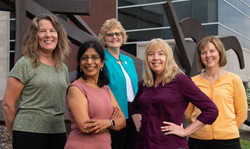Researchers to Explore Flipped Teaching in STEM Courses

Research team members (front L-R) Chaya Gopalan, Sharon Locke, (back L-R) Georgia Bracey, Julie Fickas and Lynn Bartels
A research project at Southern Illinois University Edwardsville is exploring the use of flipped teaching in science, technology, engineering and mathematics (STEM) courses. Supported by a $598,402 grant from the National Science Foundation, the three-year project will help STEM faculty at SIUE and St. Louis Community College implement flipped teaching in their courses and examine both faculty and student experiences with the method.
In the flipped model, students view lecture content outside the classroom (often via online videos), allowing class time to be used for more hands-on, collaborative work — leading to improved student learning and engagement. "We are passionate about finding ways to help students become independent learners and scholars," explained principal investigator Chaya Gopalan, associate professor in SIUE's Schools of Nursing and Education, Health and Human Behavior, in a statement. "This project will provide STEM educators and institutions with critical information about what is needed for broad implementation of flipped courses across different STEM departments and at different types of institutions, including master’s comprehensive and community college. Successful implementation is expected to improve retention and success in STEM, including retention of students who are from historically underrepresented groups."
Planned products of the research project include "a flipped teaching implementation framework, a set of design principles for flipped STEM courses, and new flipped teaching curriculum materials that will be made widely available through free, online STEM education repositories." In addition, Gopalan hopes to encourage the use of the flipped model throughout her institution. "My goal is to find other mechanisms to spread flipped teaching methodology to non-STEM faculty at SIUE in the near future," she said.
Co-PIs of the research project, "Examining Faculty Attitudes and Strategies that Support Successful Flipped Teaching," include SIUE STEM Center Director Sharon Locke, STEM Center Research Assistant Professor Georgia Bracey, SIUE Faculty Development Director and Professor of Psychology Lynn Bartels and St. Louis Community College-Forest Park Acting Provost Julie Fickas.
About the Author
Rhea Kelly is editor in chief for Campus Technology, THE Journal, and Spaces4Learning. She can be reached at [email protected].